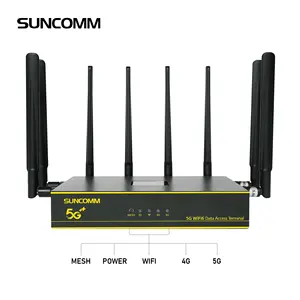The phrase wifi router antenna refers to a spectrum of devices crafted to amplify and disseminate wireless internet signals. Essential for sustaining robust and consistent connections among a variety of devices within a network, wifi router antennas are a cornerstone of digital communication. This primer aims to unravel the intricacies of wifi router antennas, equipping Alibaba.com's business clientele with the knowledge to make astute procurement choices.
Types of Wifi Router Antennas
A plethora of wifi router antennas exists, each tailored to meet specific networking requirements. For example, a 4g router with external antenna excels in areas plagued by poor cellular reception, markedly enhancing signal strength. Conversely, a tp link router 3 antenna setup is engineered for high-caliber performance in environments bustling with multiple devices, utilizing tri-band technology to adeptly navigate network traffic. Models featuring a router 4 antenna configuration offer superior reach and are frequently employed in business contexts where dense connectivity is paramount. For extending network coverage to far-flung areas, a router with remote antenna proves invaluable.
Structure of Wifi Router Antennas
The architecture of a wifi router antenna is a testament to sophisticated engineering, comprising several interworking components. At its heart lies the antenna array, which can range from a solitary wifi antenna and router to an ensemble of router external antennas for broader coverage. These antennas are coupled with transceivers that modulate and demodulate radio waves, while amplifiers bolster signal potency. The harmonious integration of these elements ensures the device's precision, guaranteeing signal transmission and reception with minimal fidelity loss.
Materials in Wifi Router Antennas
The materials chosen for wifi router antennas are prized for their conductive prowess and resilience. The external shell often employs ABS plastic, recognized for its sturdiness and impact resistance. Internally, elements like copper or aluminum are favored for their superior electrical conductivity. Materials such as TPEE and PCB are selected for the internal circuitry due to their flexibility and dependable signal transmission. These materials are not only functional but also durable, ensuring that the antennas can endure the demands of incessant use.
Business Usages and Applications
In the commercial sphere, wifi router antennas are indispensable tools. They cater to a vast range of sectors, from hospitality, ensuring uninterrupted internet access for guests, to logistics, facilitating the real-time tracking of shipments. In retail, a 4g router antenna can empower mobile point-of-sale systems, while in healthcare, they are pivotal for telemedicine services. These antennas are instrumental in streamlining operations, elevating customer satisfaction, and underpinning the infrastructure for contemporary, interconnected services.
Functions of Wifi Router Antennas
The quintessential role of a wifi router antenna is the emission and reception of wireless signals. Cutting-edge variants, such as those equipped with a router 4g external antenna, boast the additional functionality of tapping into cellular networks for internet access when traditional broadband is unavailable. They frequently incorporate technologies like MIMO (Multiple Input Multiple Output), enabling a multitude of concurrent connections without compromising signal integrity.
Features of Wifi Router Antennas
Notable attributes of wifi router antennas include their expansive range, robust signal strength, and capacity to link numerous devices. Certain models are crafted with materials that can withstand the elements for outdoor deployment, such as the 4g router with external antenna. Others, like the tp link external aerial, are designed for effortless setup and user-centric configuration. These characteristics distinguish them from their rivals, providing users with bespoke solutions tailored to their networking exigencies.
Benefits of Wifi Router Antennas
The advantages of deploying a premium wifi router antenna are multifaceted. They guarantee uninterrupted connectivity, a critical aspect for businesses dependent on cloud computing and online platforms. Employing a router external antenna can dramatically expand a network's scope, eradicating dead spots and ensuring connectivity throughout the premises.
How to Use and Choose the Right Wifi Router Antenna
Effective utilization of a wifi router antenna necessitates a grasp of your enterprise's networking needs. Selection criteria should include the spatial dimensions, device count, and the nature of applications the network will support. For high-speed internet in remote locales, a 4g router and antenna may be essential, whereas a tplink wifi antenna might suffice for modest office areas. Installation typically entails linking the antenna to the router and fine-tuning network settings for peak performance.
Maintenance and Installation of Wifi Router Antennas
Upkeep of a wifi router antenna involves periodic firmware upgrades and physical checks to ensure unobstructed signal transmission. Installation should adhere to the manufacturer's recommendations, with strategic placement to circumvent interference and optimize reach.
Target Audience and Compatibility
The intended market for wifi router antennas is vast, spanning anyone in need of dependable wireless internet. From modest home offices requiring a tp link n300 wifi wireless router tl wr845n for basic online activities to sprawling corporations seeking an advanced wifi router and antenna setup for a multitude of users, these devices are engineered to satisfy a broad spectrum of networking demands.
What are the encryption and security features?
Network security is of utmost importance for any corporate infrastructure. Wifi router antennas support a variety of encryption standards, including WPA3, the vanguard of wireless security protocols, ensuring network communications are shielded from unauthorized intrusions and cyber threats.
What standards and protocols are supported?
Adherence to wireless standards and protocols is crucial for ensuring device compatibility. Wifi router antennas accommodate a range of standards, such as Wi-Fi 6 (802.11ax), guaranteeing they can support the latest gadgets and deliver the swiftest data transfer rates.
What should I consider regarding compatibility and range?
In choosing a wifi router antenna, it's imperative to consider the assortment of devices that will connect to the network. Compatibility with various WAN ports and LAN data rates is essential, as it ensures the antenna can meet the requirements of a diverse device ecosystem while providing adequate coverage for the intended area.
Alibaba.com offers an extensive selection of wifi router antennas, addressing the varied needs of businesses in search of dependable and effective wireless networking solutions. With detailed product descriptions and specifications, business purchasers can identify the perfect wifi router antenna to match their operational needs.











































 浙公网安备 33010002000092号
浙公网安备 33010002000092号 浙B2-20120091-4
浙B2-20120091-4